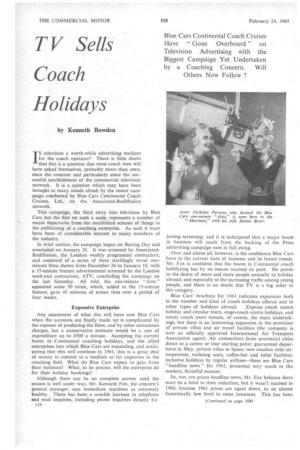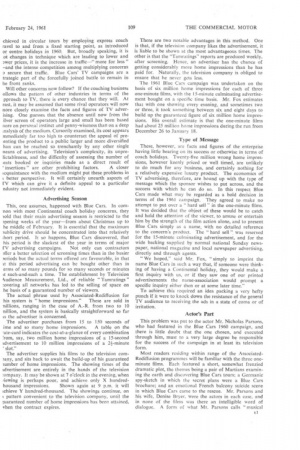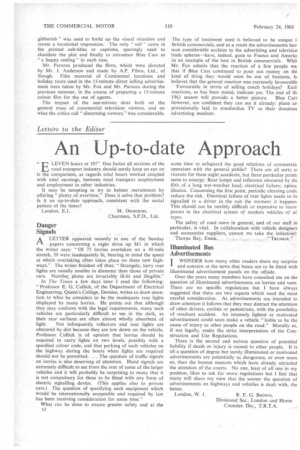TV Sells Coach Holidays
Page 62

Page 67

Page 68

If you've noticed an error in this article please click here to report it so we can fix it.
by Kenneth Bowden
IS television a worth-while advertising medium for the coach operator? There is little doubt that this is a question that most coach men will have asked themselves, probably more than once, since the creation and particularly since the suc
cessful establishment of the commercial television network. It is a question which may have been brought to many minds afresh by the recent cam paign conducted by Blue Cars Continental Coach Cruises, Ltd., on the Associated-Rediffusion network.
This campaign, the third entry into television by Blue Cars but the first on such a scale, represents a number of major departures from the established scheme of things in the publicizing of a coaching enterprise. As such it must have been of considerable interest to many members of the industry. .
In brief outline, the campaign began on Boxing Day and concluded on January 28. It was screened by AssociatedRediffusion, the London weekly programme contractors, and consisted of a series of three startlingly novel oneminute films shown from December 26 to January 18, with a 15-minute feature advertisement screened by the London week-end contractors, ATV, concluding the campaign on the last Saturday. All told, the one-minute " slots " appeared some 30 times, which, added to the 15-minute feature, gave 45 minutes of screen time over a period of four weeks.
Expensive Enterprise Any assessment of what this will have cost Blue Cars when the accounts are finally made up is complicated by the expense of producing the films, and by other extraneous charges, but a conservative estimate would be a rate of expenditure up to £500 a minute. Accepting the current boom in Continental coaching holidays, and the allied enterprises into which Blue Cars are expanding, and anticipating that this will continue in 1961, this is a great deal of money to commit to a medium so far unproven in the coaching field. What do Blue Cars expect to gain from their boldness? What, to be precise, will the enterprise do for their holiday bookings?
Although there can be no complete answer until the season is well under way, Mr. Kenneth Fox, the concern's general manager, sees immediate reactions as extremely healthy. There has been a notable increase in telephone and mail inquiries, including phone inquiries directly fol
c16 lowing screening; and it is anticipated that a major boost in business will result from the backing of the Press adverttsing campaign now in full swing.
Over and above all, however, is the confidence Blue Cars have in the current state of business and its future trends. Mr. Fox is confident that the boom in Continental coach holidaying has by no means reached its peak. He points to the desire of more and more people annually to holiday abroad, and especially to the increasing traffic among young people, and there is no doubt that TV is a big seller in this category.
Blue Cars' brochure for 1961 indicates expansion both in the number and kind of coach holidays offered and in
other types of holidays abroad. Express coach centre holiday and circular tours, stage-coach centre holidays, and scenic coach tours remain, of course, the main undertakings, but there is an interesting expansion in the provision of private villas and air travel facilities (the company is now an officially approved International Air Transport Association agent). Air connections from provincial cities direct to a centre or tour starting point; guaranteed departures.in May; private villas in Spain; new coaches with airsuspension, reclining seats, coffee-bar and toilet facilities, inclusive holidays by regular airlines—these are Blue Cars "headline news" for 1961, presented very much in the modern, thrustful manner.
So, too, are prices headline news, Mr. Fox believes there must be a limit to their reduction, but it wasn't reached in 1960, because 1961 prices are again down, to an almost fantastically low level in some instances. This has been chieved in circular tours by employing express coach ravel to and from a fixed starting point, as introduced or centre holidays in 1960. But, broadly speaking, it is .ot changes in technique which are leading to lower and awer prices, it is the increase in traffic—" more for less " —and the intense competition among multiplying concerns a secure that traffic. Blue Cars' TV campaigns are a trategic part of the forcefully joined battle to remain in he front ranks.
Will other concerns now follow? If the coaching business ollows the pattern of other industries in terms of the .pproach to TV, there is every chance that they will. At east, it may he assumed that some rival operators will now nore closely examine the facts and figures of TV adverising. One guesses that the absence until now from the dyer screen of operators large and small has been based nore on personal instinct and penny-wiseness than on a deep nalysis of the medium. Cursorily examined, its cost appears mmediately far too high to counteract the appeal of preenting the product to a public larger and more diversified han can be reached co trenchantly by any other single neans of advertising. Television's complexity, its unprelictableness, and the difficulty of assessing the number of eats booked or inquiries made as a direct result of insertions" are other prohibiting factors. A closer icquaintance with the medium might put these problems in better perspective. It will certainly unearth aspects of which can give it a definite appeal to a particular ndustry not immediately evident.
Advertising Season This, one assumes, happened with Blue Cars. In cornnon with most Continental coach holiday concerns, they told that their main advertising season is restricted to the >pening weeks of the year—from about Christmas up to he middle of February. It is essential that the maximum mblicity drive should be concentrated into that relatively ;bort period. It so happens, Blue Cars discovered, that his period is the slackest of the year in terms of major
advertising campaigns. Not only can contractors >ffer a better selection of screening times than in the busier >eriods but the actual terms offered are favourable, in that tt this period advertising can be bought other than in erms of so many pounds for so many seconds or minutes it such-and-such a time. The establishment by Television kudience Measurement, Ltd., of reliable " Tamratings " :overing all networks has led to the selling of space on he basis of a guaranteed number of viewers.
The actual phrase used by Associated-Rediffusion for his system is "home impressions." These are sold in nillions, ranging in the case of A.-R. from two to 10 nillion, and the system is basically straightforward so far is the advertiser is concerned.
The advertiser purchases from 15 to 150 seconds of ime and so many home impressions. A table on the 'ate-card indicates the cost-at-a-glance of every combination 'rom, say, two million home impressions of a 15-second tdvertisement to 10 million impressions of a 2-minute slot."
The advertiser supplies his films to the television cornany, and sits back to await the build-up of his guaranteed lumber of home impressions. The showing times of the idvertisement are entirely in the hands of the television mmpany. It may be shown at 7 o'clock in the evening, when dewing is perhaps poor, and achieve only X hundred
housand impressions. Shown again at 9 p.m. it will ichieve Y hundred-thousand. The showings continue, on pattern convenient to the television company, until the ;uaranteed number of home impressions has been attained, vhen the contract expires. There are two notable advantages in this method. One is that, if the television company likes the advertisement, it is liable to be shown at the most advantageous times. The other is that the "Tarnratings" reports are produced weekly, after screening. Hence, an advertiser has the chance of getting considerably more home impressions than he has paid for. Naturally, the television company is obliged to ensure that he never gets less.
The 1961 Blue Cars campaign was undertaken on the basis of six million home impressions for each of three one-minute films, with the 15-minute culminating advertisement bought on a specific time basis. Mr. Fox estimates that with one showing every evening, and sometimes two or three, it took something between six and eight days to build up the guaranteed figure of six million home impressions. His overall estimate is that the one-minute films had about 25 million home impressions during the run from December 26 to January 18.
Type of .Message These, however, are facts and figures of the enterprise having little bearing on its success or otherwise in terms of coach holidays. Twenty-five million wrong horn e impressions, however keenly priced or well timed, are unlikely to do much for any business, and certainly nothing for a relatively expensive luxury product. The economies of TV advertising, therefore, are bound up with the type of message which the sponsor wishes to put across, and the success with which he can do so. In this respect Blue Cars made what may be regarded as a bold decision in terms of the 1961 campaign. They agreed to make no attempt to put over a " hard sell" in the one-minute films. It was decided that the object of these would be to catch and hold the attention of the viewer, to amuse or entertain him by the strength of the film action alone, and to present Blue Cars simply as a name, with no detailed reference to the concern's product. The "hard sell ", was reserved for the 15-minute culminating advertisement, and for the wide backing supplied by normal national Sunday newspaper, national magazine and local newspaper advertising, directly and through agents.
"We hoped," said Mr. Fox, "simply to imprint the name Blue Cars in such a way that, if someone were thinking of having a Continental holiday, they would make a first inquiry with us, or if they saw one of our printed advertisements the name-association would prompt a specific inquiry either then or at some later time."
To achieve this required an idea packing a very hefty punch if it were to knock down the resistance of the general TV audience to receiving the ads in a state of coma or of irritation.
Actor's Part This problem was put to the actor Mr. Nicholas Parsons, who had featured in the Blue Cars 1960 campaign, and there is little doubt that the one chosen, and executed through him, must to a very large degree be responsible for the success of the campaign in at least its television form.
Most readers residing within range of the AssociatedRediffusion programmes will be familiar with the three oneminute films. Each featured a short, somewhat frenzied dramatic plot, the themes being a pair of Martians examining the earth and discovering Blue Cars tours; a Germanic spy-sketch in which the secret plans were a Blue Cars brochure; and an emotional French balcony suicide scene in which Blue Cars came to the rescue. Mr. Parsons and his wife, Denise Bryer, were the actors in each case, and in none of the films was there an intelligible word of dialogue. A form of what Mr. Parsons calls "musical gibberish " was used to build up the visual situation and create a locational impression. The only "sell " came in the printed sub-titles or captions, sparingly used to elucidate the plot and finally to introduce Blue Cars as "a happy ending" in each case.
Mr. Parsons produced the films, which were directed by Mr. J. Anderson and made by A.P. Films, Ltd., of Slough. Film material of Continental locations and holiday tours used in the 15-minute direct selling advertisement were taken by Mr. Fox and Mr. Parsons during the previous summer, in the course of preparing a 15-minute colour film for the use of agents.
The impact of the one-minute slots both on the general mass of commercial television viewers, and on what the critics call "discerning viewers," was considerable. The type of treatment used is believed to be unique British commercials, and as a result the advertisements hay won considerable acclaim in the advertising and televisiot trade spheres—have, indeed, gone to France and Americt as an example of the best in British commercials. Whit Mr. Fox admits that the reaction of a few people wa that if Blue Cars continued to pour out money on thi kind of thing they would soon be out of business, hi believes that the general reaction was extremely favourable Favourable in terms of selling coach holidays? Earl: reactions, as has been stated, indicate yes. The end of th 196,1 season will provide a better picture. Blue Can however, are confident they can see it already: plans arl provisionally laid to standardize TV as their dominan advertising medium.




































































































































































